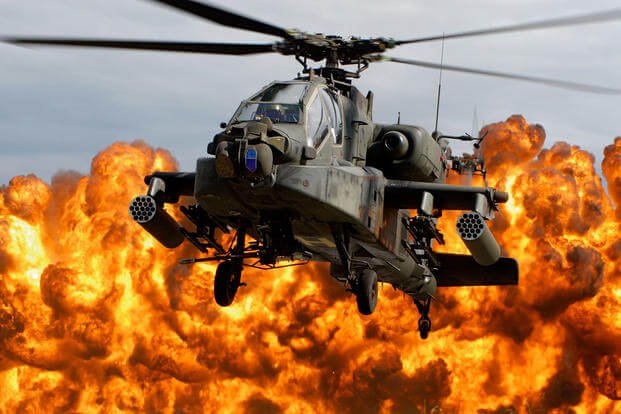U.S. attack helicopters -- AH-64 Apaches -- could be committed against the Islamic State for the first time in an accelerated campaign to retake Mosul that the Iraqis and Kurds say will happen this year, the top U.S. commander for Iraq and Syria said Monday.
In his upbeat overview of the progress of the campaign, Army Lt. Gen. Sean MacFarland steered clear of endorsing the repeated prediction of Iraqi Prime Minister Haider al-Abadi that the Islamic State in Iraq and Syria, or ISIS, will be driven from Mosul before the end of the year, but said he was in a rush to defeat the terrorist group.
"I don't want to put a date out there," MacFarland said, but "I would like to get this wrapped up as fast as I possibly can."
Use of the Boeing Co.-made attack helicopters in Mosul, Iraq's second largest city, was contingent upon the Iraqis making a formal request for them, MacFarland said in a video briefing from Baghdad to the Pentagon. The Iraqis pointedly did not ask for them in the long-delayed but eventually successful action to retake the flashpoint city of Ramadi in Anbar province in December.
MacFarland said that Abadi didn't issue a flat-out rejection of the Apaches, but "he did say maybe little bit down the road" the attack helicopters would be useful in another action. "We are in a constant dialogue with the Iraqis about what kind of support they require."
MacFarland added, "We can't inflict help on somebody. They have to ask for it, they have to want it and we're here to provide it as required," said the general, who was named by Defense Secretary Ashton Carter to take over as head of Combined Joint Task Force-Operation Inherent Resolve last October.
He was put in overall charge of U.S. efforts in Iraq and Syria following widespread criticism that the campaign lacked coordination and unity of command.
In announcing MacFarland's appointment last year, Carter said, "Rather than three generals responsible for different aspects of the campaign, as had been the case, I have empowered Lt. Gen. MacFarland as the single commander of counter-ISIL activities in both Iraq and Syria," using another for ISIS.
Since then, MacFarland said, "We have shifted form pure counter insurgency to combined arms" operations using coalition airpower to back up local forces on the ground in shrinking the areas controlled by ISIS. He estimated the terrorist group has lost 40 percent of the areas it controlled since invading Iraqi in the summer of 2014.
"We'll attack the enemy with airstrikes, and enhance the lethality of partner forces on the ground" in both Iraq and Syria, MacFarland said. "It's easy to say, tougher to do, but we're making progress."
Even so, MacFarland acknowledged the military campaign in Syria was much tougher.
"The enemy is still strong in Syria," though the Syrian Democratic Forces, aided by U.S. Special forces advisors on the ground in northeastern Syria, "have made dramatic gains. Overall the trend I believe is going in the right direction."
-- Richard Sisk can be reached at Richard.Sisk@Military.com.
Related Video:





























